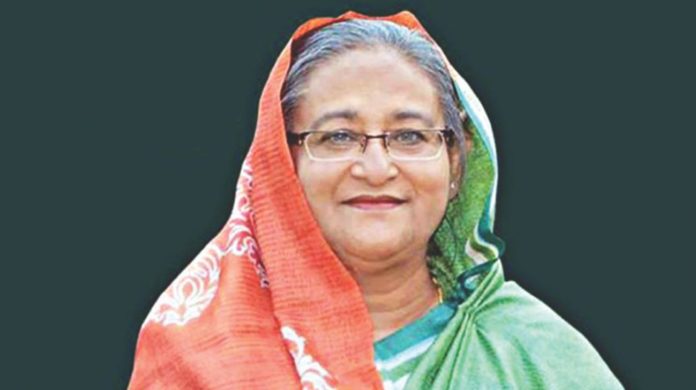DHAKA, Dec 06, 2018 (BSS) – Prime Minister Sheikh Hasina has predicted that Bangladesh economic growth will boost as high as 10 percent over the next three years.
“Bangladesh’s rapid economic expansion will pick up further momentum to hit 10% annual growth over the next three years,” She told in an interview with Nikkei Asian Review, a flagship newspaper of Nikkei Inc., today.
Yuji Kuronuma, Nikkei staff writer, and Gwen Robinson, Nikkei Asian Review editor-at-large interviewed the Prime Minister.
The 71-year-old leader said her nation will shed its “least developed country” status from 2024. Hasina has overseen nearly a decade of consistent expansions of around 6% to 7%, with the economy growing 7.86% in real terms in the fiscal year that ended in June.
The prime minister said growth is projected to accelerate to 8.25% this fiscal year and would continue to increase. “If elected, I can assure you that the program we have undertaken will get us up to 10% by 2021,” she said.
Sheikh Hasina said Bangladesh could become Asia’s fastest growing economy through a range a policies. One example she gave was the country’s attempt to coax foreign companies to set up in a new network of 100 special economic zones.
Currently 11 of the zones are now functioning and 79 are under construction.
The streets of Dhaka, Hasina said, Bangladesh will begin seeking bids for its second nuclear power plant project as soon as next year.
Russia and India are building the country’s first nuclear plant in Rooppur in western Bangladesh. Hasina said that the facility’s two reactors, with output capacity totaling 2,400 megawatts, “will start producing electricity [in] 2024.”
As for the proposed second plant, “we are still searching for land,” she said, adding that she hoped to build it in the south, one of the country’s poorest regions.
Hasina said Bangladesh will consider inviting proposals after the election, once the land is secured.
Stressing her country’s “good relations” with all powers, Hasina said only that Dhaka would choose a proposal for the plant that is “suitable and comfortable for our country.”
About the issue of 800,000 or so Rohingya refugees who fled from Myanmar into Bangladesh from late 2016, Hasina brushed aside concerns that the situation would become an election issue.
She said Bangladeshis felt solidarity with the Rohingya after their own experiences in the independence war with Pakistan in 1971, when an estimated 10 million fled into neighboring India.
“I am very lucky that people trusted me, when I called upon my people to recognize their suffering. If necessary, we will share our food. Our people accepted this,” she said of Bangladesh taking in Rohingya refugees.
“We have done our part. We gave them shelter, we are providing them food, health care and taking care of children and taking care of women,” she added.
The two countries had agreed to commence repatriation of refugees in mid-November but these efforts stalled after the first group of returnees refused to leave.
Hasina confirmed plans to relocate some refugees to new facilities on a nearby island, but rejected international concerns that the flood-prone island would be like a prison camp.
“It is a beautiful island, it is used by people to farm cattle. They can live in a better way there; children will get education, health care; we built a warehouse so we can deliver the relief.
“At this moment, we are preparing for 100,000. But we can take 1 million there,” she said.
The prime minister repeated assurances that no refugee would be forced to return to Myanmar but called on other countries and multinational organizations to help resolve the issue.
It is now the international community’s turn to figure out “how to make Myanmar take back their people to their own country,” she said.



